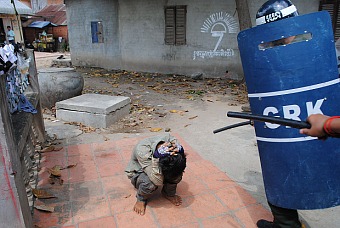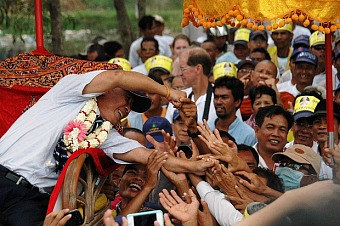Year 2013 in Review: Impunity in the Cambodian Courts
Published on 20 March 2014As part of the lead-up to the release of our report “Human Rights 2013: the Year in Review,” LICADHO is publishing a four-part web series reviewing the key human rights events of 2013. Daily installments will be published throughout the week, culminating with the publication of our report on March 24.
As the swelling protests were met with increased suppression, the judicial system remained true to form. 2013 saw a number of high-profile cases in court, with mixed results.
After spending eight months in prison, the Court of Appeal ordered Mam Sonando, owner of independent radio station Beehive, and his co-defendants released on March 15, which ended a bizarre saga that originally saw the him imprisoned for leading a so-called “secession movement” in Kratie province. Sonando had been arrested in July, 2012, and convicted of various secession-related crimes in October; he was sentenced to 20 years in prison. In the end, the Court of Appeal inexplicably changed Sonando’s charges to illegal-logging related crimes, reduced his sentence to five years, and suspended all but the eight months that Sonando had already served. His legal battles prompted large protests in Phnom Penh, as hundreds of supporters gathered outside the courtroom for each of his hearings.
2013 brought good news in two more high-profile cases. Yorm Bopha was released on bail after 14 months in prison, and Chea Vichea murder scapegoats Born Samnang and Sok Sam Ouen were declared not guilty by the Supreme Court.
Bopha had been arrested on September 4, 2012, for allegedly arranging the beating of a man near her home. Despite a total lack of evidence connecting her to the assault, she was convicted in December 2012 and sentenced to three years in prison. Bopha, who was named an Amnesty International prisoner of conscience, was active in the protest movement to release 15 other members of the Boeung Kak community in 2012, and authorities warned her that she would face trouble in retaliation for her activism. On June 14, the Court of Appeal slightly altered the charges against Bopha and suspended one year of her sentence, but refused to overturn her conviction despite the continued lack of evidence. On November 22, following an extensive national and international advocacy campaign, the Supreme Court released Bopha on bail after more than 14 months in prison. Nonetheless, the charges were not dropped – her case will be sent back to the Court of Appeal, and she could be returned to prison at any time.
Born Samnang and Sok Sam Oeun, scapegoats in the 2004 killing of union leader Chea Vichea, were finally freed by the Supreme Court on September 25. Despite the absence of any credible evidence, the two were sentenced to 20 years’ imprisonment for his murder in a show trial in 2005. They were bailed in December 2008 by the Supreme Court, in a decision which ordered a re-investigation into the killing amid extensive evidence of their innocence. They were re-arrested on December 27, 2012 after the Court of Appeal shockingly upheld their original verdict, and returned them to prison to serve the remainder of their sentence. The appeal hearing of 2012 offered no new evidence of Sok Sam Oeun and Born Samnang’s guilt and systemically dismissed and ignored evidence and testimonies supporting the pair’s innocence. In total, they spent more than five years in prison. The Supreme Court dropped all charges against them, citing a lack of credible evidence. However, the judge explicitly forbade the pair from seeking financial reparations for the five years spent in prison and the eight years spent wrongfully charged with a crime they never committed. The real killers of Chea Vichea remain unknown.
In stark contrast to the above cases, former Bavet governor Chhouk Bandith remains a free man, despite the existence of an arrest warrant and a criminal conviction finding that he fired his gun at a crowd of striking garment workers in 2012, seriously injuring three. After a year-long legal journey that saw charges briefly dropped altogether, Bandith was finally convicted of causing ‘unintentional injury’ on June 25, and sentenced to one-and-a-half years in prison. He did not attend his trial. An arrest warrant has been issued, but he remained at large as of the end of 2013.
MP3 format: Listen to audio version in Khmer
- Topics
- Judiciary/Rule of Law Labour Rights
- Related









